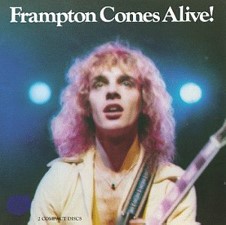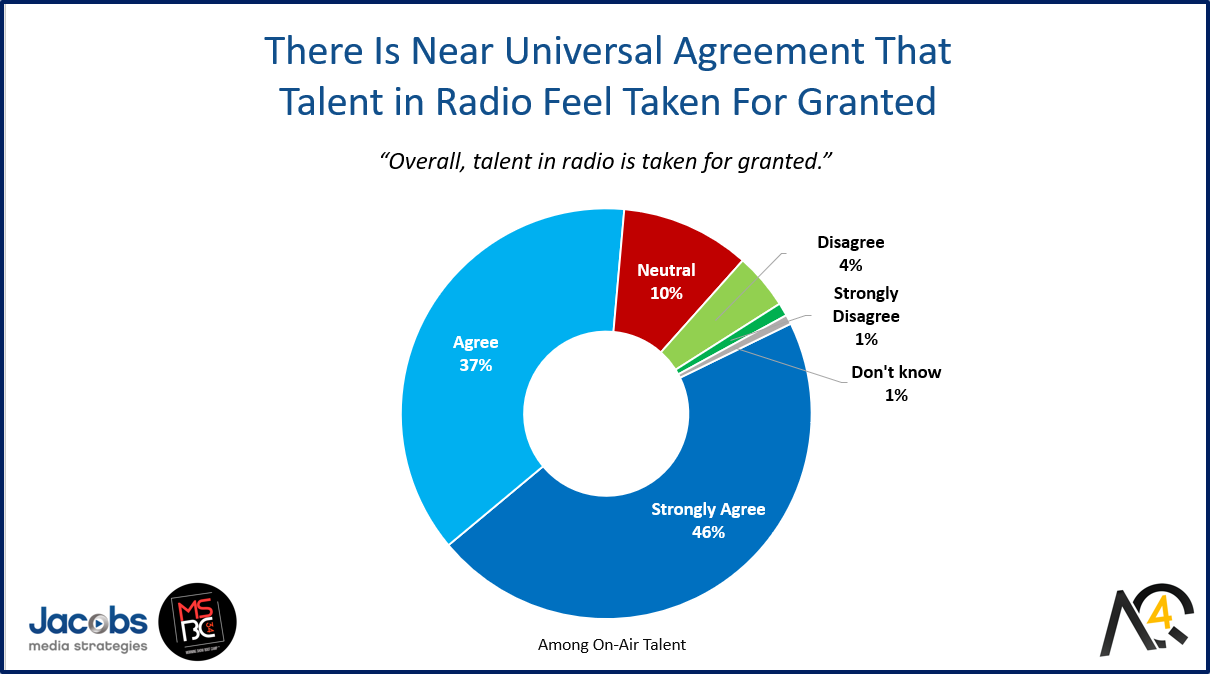
Yesterday morning, I experienced a rare moment few researchers get to experience. It took place at Morning Show Boot Camp 34 in Chicago in front of a live audience of attentive radio personalities riveted by their reflections in a statistical looking glass.
As most research analysts will tell you, there are few times where you get the chance to present a research study to a large crowd of hundreds of people, many of whom took the survey themselves. And this research study isn’t about a mundane topic, like purchasing habits, political preferences, or perceptions about soda brands. This study is about their careers – how they spend most of their waking hours, what defines them, and what most of them love – or loved.
Usually when a researcher unveils the results of a study, it’s before a small group of executives or stakeholders responsible for a brand, product, or service. But this study, AQ4, is our survey of air talent of commercial radio air personalities – people who make their living on the airwaves, connecting with communities behind the mic, from station studios or using remote facilities, especially since COVID.
The vibe that made this year’s Boot Camp so electric is that its impresario, Don Anthony, makes it the lead presentation of the conference – it sets the tone for the next two days. And it’s the sheer size of this crowd, and the high degree to which they feel invested in the data that strikes me every year. They are the most attentive audience I present to all year. They’re not on their phones, doom scrolling their social feeds, or chitchatting with each other.
They are staring at the big screens in the room, watching how they collectively evaluate their careers, their work-life balance, their working environments, and the companies that employ them. They also get to see how they and their peers rate their stress levels, their mental health, and their attitudes about a rapidly changing radio industry.
companies that employ them. They also get to see how they and their peers rate their stress levels, their mental health, and their attitudes about a rapidly changing radio industry.
And they can stand the truth. In fact, as I spoke to MSBC attendees – many of whom were first-timers – throughout the day and into the evening, the message was the same. The view the data as a statistical bucket of cold water, but a necessary one to both take in and process.
And unlike research that most of us see, these AQ4 pie charts and graphs aren’t shown over an austere Zoom screen where participants can hide by shutting off their cameras or muting their audio. It’s like a research Rorschach Test – every slide elicits an instant response from the audience, sometimes with sound ranging from gasps to laughs, while others data points are accompanied by knowing nods, and often with head shakes. There’s no hiding from these research results than can’t be unseen.
There’s some built-in levity in the data. There has to be, because the news from these AQ studies has been consistently sobering. In the first study, I asked about whether these personalities had ever dated (or married) a listener (40% had). Last year, the paramount question was whether they ever eat “listener food,” brought to the station by an audience member. (More than two-thirds sometimes do.)
And this year, it was about identifying their go-to go-to-the-bathroom song. It was a tight race, but the winner was Peter Frampton’s “Do You Feel Like What We Do?” (live) – all 14 minutes and 16 seconds of it. (Imagine what you can during that almost quarter-hour.)
(live) – all 14 minutes and 16 seconds of it. (Imagine what you can during that almost quarter-hour.)
But similar to the three previous studies revealed at past Boot Camps, this year’s presentation was serious business. It has to be. Because this is their careers we’re talking about.
Their passion remains at a very strong point. And this was evidenced by subsequent panels yesterday. The best prepared, most strategic personalities are building their personal brands – via social media, video, and other digital tools – and also with creative side hustles – associated enterprises that are creative, innovative, and in several cases, highly profitable.
Meantime, attitudes toward the stations that carry their shows, and the companies that own them have both sunk to new, disturbing lows. They may still have passion for radio as a craft, a mission, and way to connect to communities. But they are underwhelmed with their employers, favoring medium-sized companies over the behemoths in the radio broadcasting industry.
Not surprisingly, many are concerned about the impact of a looming recession. And just because this is often the way things work in radio, few missed the irony that reductions in force were taking place around the country on the very same day throngs at Boot Camp were simultaneously watching the data roll by. Truth be told, the survey was fielded in July, an especially bad time for inflation, as gas prices rose above the $5 a gallon mark. Still, stress, angst, and foreboding were both on the slides and present in the ballroom.
So, now what?
We’ll be scheduling a free industry webinar that any of you can attend in the next few weeks. I want you to see this data, especially if you’re an industry leader, a decision-maker, or part of a corporate team. In the same way you use research to check audience perceptions of your stations or to determine your sales ranking, this data provides an important benchmark for the health, welfare, and shape of perhaps your most important assets.
Your talent.
I will also make the offer to personally and privately present AQ4 to any and every broadcast radio CEO (and their teams). I want you to see this study, and benefit from it, because I strongly believe it has value to your companies, your assets, and your employees. You can send me a confidential email to schedule it here.
A question we’ve started including in this study is asking talent to count up the number of “hats” they wear – the different jobs they’re tasked with at their stations and/or their companies. AQ4 tells us the average personality is in “hat trick” mode – that is, they’re doing the equivalent of three different jobs. That’s a lot of responsibility even for those who are skilled multitaskers.
One of the coolest things about Boot Camp is seeing some of the famous alums return to the conference to encourage and mentor their young counterparts. Icons like Bob Rivers were on hand, along with masters like B.J. Shea, Paul Castronovo, Bert Weiss, Mojo, and many others. And I know they must look at this data, and reflect on the fact that through their careers, most had just one important assignment – being as entertaining as possible during their hours on the air – throughout their illustrious careers. As they say, they had ONE job to do. Today’s on-air personalities should be so lucky.
There are nearly a couple hundred slides in my master deck. Yesterday at Boot Camp, I only had time for about 50 of them before I was joined on stage by Hubbard’s Greg Strassell, talent coach Angela Perelli, and Jodi Koontz of the Murphy, Sam, & Jodi Show.” We discussed AQ4 and what it means in their respective worlds.
So, I hope to get the most salient, telling, and actionable data points out there over the next weeks and months.
But when many of you ask me, “What’s the most important thing you learned from AQ4?” I’d have to go with this one:

NO ONE likes to be taken for granted.
- Media And Technology In 2025: Believe It Or Not! - April 18, 2025
- In Radio, You Just Never Know - April 17, 2025
- The Secret To Making A Great Podcast (And Great Radio) - April 16, 2025




Don’t miss Pery Michael Simon’s letter this morning, based on your taken-for-granted slide.
https://www.allaccess.com/mail/archive/theLetter/2022-8-19.html
Thanks for letting me know about Mr. PMS. I always love to mix it up with the “king of snark.” If Perry could have been there at MSBC, I think he would’ve been impressed with the effort, passion, and commitment young people who want to excel at radio have..
Taken for granted? Not really new. My first job was with a station that had “house names”. The voices would change, the names stayed the same. Of course it was minimum wage, $1.65 an hour I think. But the owner was convinced that if the current “Danny DeeJay” didn’t like working there, he’d be replaced in a heartbeat by the next “Danny DeeJay”.
Most who got into radio learned on the job. Most will happily wear multiple hats to help the cause. A sense of appreciation from the other departments could go a long way in minimizing the “taken for granted” feeling. But, when the local managers are beaten daily by the national managers who are beaten by the corporate managers who are beaten by the ridiculous belief that broadcasting is a big business that belongs on Wall Street, the term that poop rolls downhill applies.
Broadcasting’s opportunities are still so evident that it’s a shame that no one’s figured out how to capitalize on them and make a bigger deal out of the talent involved.
Dave, that premise has crossed my mind many times. We ALL wore many hats, were poorly paid (or worked for free), and were taken for granted.
The difference is that radio was an exciting, vibrant, highly profitable, business. It was hard to break into radio because so many people wanted “in.”
We’re living in much different times. We need young people not just to fill jobs that don’t pay as much but also reinvigorate our industry. And they could earn more flipping burgers at a fast food restaurant down the street.
After spending another two days at Boot Camp, I marvel at how SO enthusiastic for radio they are, even after I show them my 60 depressing research slides. The fact their energy and undying excitement for radio is so often taken for granted is what I find heartbreaking.
Thanks, Dave.